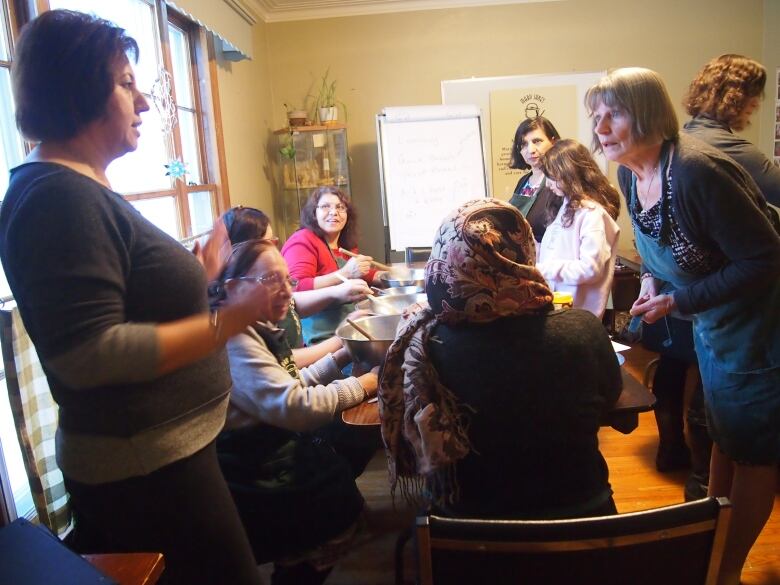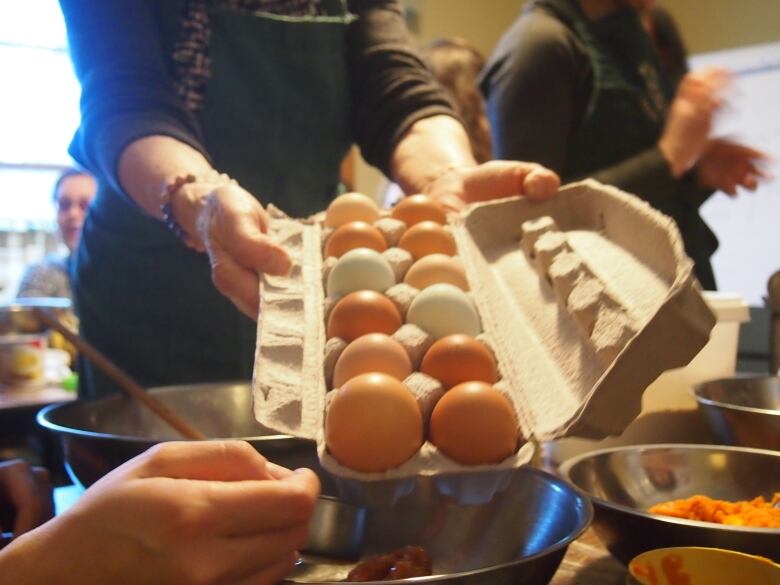Cooking class helps Afghan immigrants feel at home in Canada
12-week Flavours of Home course teaches Canadian recipes and food safety to immigrants

A local cooking school is offering classes for Afghan women who want to learn about Canadian food.
Run out of Mary Jane's Cooking School,Flavours of Home isa 12-week course that covers everything from how and where to buy ingredients, to safe food handling practices, to detailed recipes.
"That's an important part of settlement, and to feel like you belong as a Canadian," saysMary Jane Eason, owner of Mary Jane's Cooking School. "If you go to a new country you want to know how to cook their food."
Eason has been running the school for almost 20 years. It's a registered charity funded by The Winnipeg Foundation.
By trade, she's a trained nutritionist, so healthy, organic and environmentally friendly cooking is a main tenet in all of her classes. And Flavours of Home is no exception.
Eason runs the class alongside Ariana Yaftali, who immigrated from Afghanistan 15 years ago.

Yaftali is also the founder of the Afghan Canadian Women's Organization. Earlier this year, she approached Eason with the idea for the class. She says she thought it would really help some of the women she works with to settle in to a new community here in Winnipeg.
"Some of the women have been here for years, and others only two months," saysYaftali. "They can gather and learn from each other, and from Mary Jane.
"They've come from different backgrounds, social class, even education, ethnic background. But what we do, we promote that if you're open to learn and share, then you are most welcome."
Yaftali says food can be a difficult part of the transition to Canada for some Afghans. Many of the ingredients they're used to aren't available here and Winnipeg doesn't have any Afghan restaurants.
She says this class gets to the heart of that difficulty.
"With the class the women will know what to look for in the grocery store and how to ask for help finding it," saysYaftali.
Another big part of the class is the language component.
Many of the women are still learning English so the instructors make the recipes into mini English lessons.
Eason instructs, while Yaftali translates to Farsi or Dari, and they hand out the paper recipes in English.
A new way of cooking
Yaftali says it took a few classes for some of the women to catch on to the methods used in Canadian cooking.
"They are all skilled cooks in their own right but they aren't really used to recipes," says Yaftali. "Afghan cooking is about instinct."
She says she learned to cook by watching her mother and other elders. For those who learned that way, exact measurements can be a new concept.
But that hasn't stopped any of the women in the class from jumping right in.
Tamama Afzaly, one of the students in the class, says she's having a lot of fun learning new recipes especially the ones that involve baking.

Afzaly came to Canada almost two years ago. She does most of the cooking for her husband and their seven-year-old daughter.
"[My daughter] likes cookies and cakes; she likes the sweet things," says Afzaly.
She says it's been harder to get her daughter to eat some of the other dishes she brings home from the class but she's going to keep trying because all of the recipes are healthier than what she learned to cook growing up in Afghanistan.
"That's what I like about Canadian food," says Afzaly. "In Afghanistan we don't use like low salt-oil. Canadian food is so healthy."
Hoping to keep the class going
The 12-week course came to an end on Dec. 16, but they have one more event planned to cap the whole thing off.
Eason and Yaftali will hold a completion ceremony for the women and their families. They'll gather at the school on Sunday to hand out certificates, share what they learned during the course and enjoy some homemade food.
"It's become a gathering place for the women," says Yaftali.
She says the women have formed their own little community and she hopes they can all keep that going.
As for the class itself, she wants to run it again in the new year. Yaftali says she hopes to get even more Afghan women joining the next time around.
Eason says the school plans to submit an application to the Winnipeg Foundation for more funding. She wants to open the program to marginalized groups throughout the city. She says ideally, they'll be able to offer classes to more than just newcomers.












_(720p).jpg)


 OFFICIAL HD MUSIC VIDEO.jpg)
.jpg)



























































































